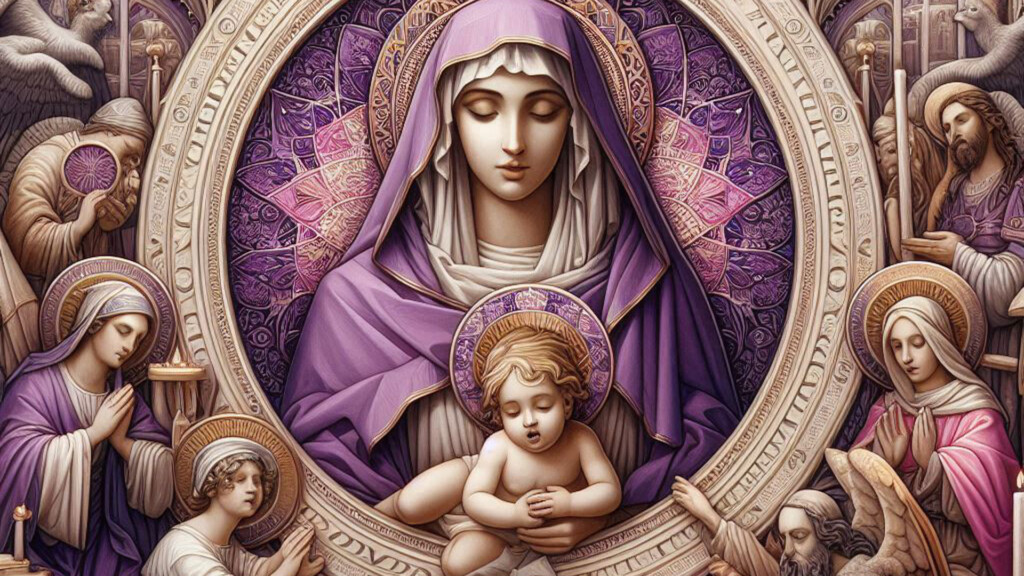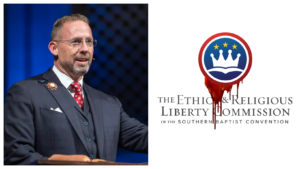It’s been nearly 10 years since the Baptist Pravda Press announced that Baptists had “rediscovered” Advent. Apparently, we realized it was “needed in a cultural context in which we are battered on every side to be diverted away from…a focus on Christ” and were now finding it useful in “provid[ing] a bit of structure in a tradition that has maybe gone too far without structure,” according to then-provost at Oklahoma Baptist University Stan Norman. Market-attuned evangelical churches and the Christian retailers who supply them, sensing a shift away from the freewheeling worldliness of much of contemporary worship, naturally pounced on the opportunity to provide the “life-changing” programs, events, and materials needed to facilitate this liturgical response to the “is this even a church?” excesses of seeker sensitivity.
Baptists had just finished “rediscovering” contemplative prayer and related so-called “spiritual disciplines,” long forgotten the Prayer of Jabez and our WWJD bracelets, were busy circling things with our prayer and had yet to “discover” the power of the Enneagram to aid our sanctification. Disaffected mainliners who left their pink-haired, rainbow-flagged “churches” for more conservative pastures were all too happy to see the low and free worshipers in Baptist and non-denominational churches respond to the spiritual market by adopting a little bit of the liturgy they were used to, and Christian retailers had a lucrative new revenue stream in likewise responding to the market shift. A quick search at Lifeway.com returns hundreds of listings under “advent,” with something for every persuasion and from all the usual names. Shoppers can pick up one of the dozens of Advent studies from “Lifeway Women,” meditation journals, and devotionals from Matt Chandler, Al Mohler, Beth Moore, or David Platt.
Yet observance of the Advent season began long before we were able to order Hot Wheels Advent calendars for our children. While the exact origins remain unknown, historians trace the beginnings of Advent (originally called the “Lent of St. Martin”) to the fifth-century practice of fasting three times a week between Old Halloween (St. Martin’s Day) and Christmas. By the 14th century, it was customary for the Catholic church to observe five weeks of lent-ish Advent, which remained liturgically unchanged until the Second Vatican Council in the 1960s.
To Sin or Not to Sin
Within the boundaries of scripture, Christians can exercise substantial liberty in their worship practices. Daily devotionals, prayer, meditation, and music styles – all fall into the category of liberty when regulated by scripture. “Observing Advent” in the sense that it remains a deliberate organizational emphasis within worship is no different than planning a sermon series or working through a Bible study. Yet much like other “spiritual disciplines” are not scripturally prescribed (think journaling, word studies, or “praying the Bible”), liturgical observations can easily slip into a “required for sanctification” category. Much like Catholicism encourages observation of Advent in a sacramental sense (it leads to particular spiritual benefits like forgiveness), Christian corporate practice of extrabiblical traditions risks establishing the necessity of man-made practices for sanctification. A practice (discipline) deemed helpful in bringing about sanctification (formation) could logically stifle sanctification if not practiced. And failing to do what is needed for Christian growth would be sinful, would it not?
Why Puritans and Baptists Dumped Advent
Despite the claim by Advent-observing Baptists, our theological forefathers didn’t reject Advent because it was too “Catholic.” They rejected it because it was neither prescribed (nor described) in scripture, and its clear purpose (much like other liturgical observances) was conferring sacramental benefit, often through the mediation of Mary. In fact, around the same time Baptists were “rediscovering” Advent, now-deceased Pope Benedict XVI was reminding us that “To celebrate Advent means: to become Marian, to enter into that communion with Mary’s ‘Yes,’ which, ever anew, is room for God’s birth, for the ‘fullness of time.'”
Even after the rules for fasting fell by the wayside, “the faithful” are instructed to “fast during the first two weeks in particular and receive the Sacrament of Reconciliation.” Much like its origins as the “Lent of St. Martin,” Advent observance remains a work of self-denial for the purpose of receiving forgiveness. Or, in other words, a practice that rejects the nature of the Gospel. The rejection of Advent was profoundly spiritual for our Protestant forefathers, not some surface-level anti-Catholic thing.
Scripture reminds us that, while believers are free to establish traditions and special days in accordance with Christian liberty, there is no such thing as days that are more holy than others (Rom. 14:5), nor any specific, extrabiblical traditions that offer access to forgiveness or any other spiritual benefit. With disaffected high-church Advent observers leaving Catholicism or mainline liberal churches for the biblical sufficiency of conservative churches, scriptural sufficientists should examine the wisdom of “rediscovering” practices that our forefathers purposefully rejected. Instead, we may find it wise to remind our congregations that the same scriptural sufficiency that protects our churches from the liberalism many of them escaped is what keeps us from “rediscovering” or repurposing the works-based traditions of the churches they left.























22 responses to “The Case Against Advent”
Make money online from home extra cash more than 18000 to 21000 Dollars. Start getting paid every month Thousands Dollars online. I have received 26000 Dollars in this month by just working online from home in my part time. every person easily do this job by.
HERE====)> https://goo.by/wpBnot
If you just want to go through the Messicanic prophecies in Isaiah in early December, great. But what else can you even do with “Advent” without turning it into absolute cringe?
What else can you do? Our family invites non-Christian families to our home on Advent Sundays, when we explain the meaning of the Advent wreath symbols, the candles representing Jesus as the Light of the World, and read Scripture. This leads to evangelistic discussions. Obviously, Advent should not become a sacrament, but it is a time when many unbelievers are more open to spiritual things. If observing Advent leads people to focus on Christ, that’s a good thing, is it not?
You could do stuff like that all year long, so its basically dumb. Advent is a Judaizing concept of simulating “We’re Jews waiting for the Messiah to arrive.” Its larping, fake and gay, and leads to Dispenstionalism, Zionism, and Judaizing heresies.
Our former pastor had a love for the Anglican church, so we had advent with candle lighting, special readings, and sermons anticipating the birth of Christ. There was no problem with it, but the high church feel did not fit. Our church was shifting from a hipster congregation to a congregation that reflected the neighborhood. We had more working class folks, more people with mental challenges, some ex-cons, and drug addicts. And people are coming to know Christ! As I took on the preaching duties, we did away with the high church and use the time when everyone is thinking about Christmas to focus on the coming of Christ and all that entails.
It can be easy to get caught up in all things liturgical and lose the plot in the process.
I was wondering where this pushing of advent observance was coming from… now I think I understand better.
Sanctification is a free gift, just as salvation. The sanctifying work of the Holy Spirit is a result. It is a matter of being led by the spirit, and not by the flesh. There is no sanctification by works any more than there is salvation by works. Beyond simple submission to the Lord, we don’t cause it to happen, but we can stop it from happening, by purposefully ignoring the conviction of the Spirit, by quenching the Spirit and searing the conscience, and so on.
1 Thess. 5:15-22 says …
“15 See that no one repays anyone evil for evil, but always seek to do good to one another and to everyone. 16 Rejoice always, 17 pray without ceasing, 18 give thanks in all circumstances; for this is the will of God in Christ Jesus for you. 19 Do not quench the Spirit. 20 Do not despise prophecies, 21 but test everything; hold fast what is good. 22 Abstain from every form of evil.”
Jesus fulfilled all the ritualistic and ceremonial aspects of the law. But what that ultimately means is that it ceased to be an effort of man, and became a work of God. No longer through mankind’s own efforts to earn salvation, it became God’s effort to freely give salvation. We cannot work for and earn sanctification any more than we can work for and earn salvation.
Rather than rituals, and ceremonies, holidays and seasons of prayer, the scripture says “pray without ceasing”.
Heed the conviction of the Holy Spirit: “Do not quench the Spirit”
And through being led by the Spirit, and not the flesh, we are able to “Abstain from every form of evil.”
“But I say, walk by the Spirit, and you will not gratify the desires of the flesh. 17 For the desires of the flesh are against the Spirit, and the desires of the Spirit are against the flesh, for these are opposed to each other, to keep you from doing the things you want to do.” – Gal 5:16-17
The Lord’s yoke is easy. His burden is light (Matt. 11:30). It is not grievous or burdensome (1 John 5:3). It doesn’t take any work on our part. All we have to do is just listen and follow. Heed that still small voice (1 Kings 19:12). Don’t quench the spirit. Don’t sear the conscience. Our growth is a work of the Lord. We can’t cause it any more than we can cause a seedling to grow into a tree. We can only hinder and prevent it. As long as we don’t get in His way, then He will take care of the rest.
We are born wicked. We are reborn righteous.
Which is to say, before it took work to be righteous. Now, because of the indwelling of the Holy Spirit, it takes work not to be. It becomes much more difficult to quench and fight against the Spirit, than it is to listen and obey.
How can you who celebrate the Christ-Mass complain about Advent? You must accept all the Romish holy-days unless you want to contradict yourselves and be hypocrites.
I don’t know that anybody’s complaining. As David noted, it is a Romans 14 sort of observance, like covering the head, circumcision, and so on. There’s nothing necessarily wrong with it unless it reaches the point where it is deemed a requirement for salvation or sanctification. The danger of putting traditions, rituals, and ceremony in such a wrongful place is that it could take one out from under grace, and back under the law (Gal 5:2-6). It essentially would be to deny Jesus as the complete and final fulfillment of all ritual and ceremony. Beyond that caution, if there is no indication that it is being deemed to be such a requirement, then we should heed Rom. 14:20-23, and say nothing else about it, imo, to avoid causing others to stumble.
Celebrating Christmas is a bit different. It’s not, as David put it in the article above, likely to be deemed to be necessary for sanctification.
But I don’t believe anybody is complaining here, except the rabid antisemites like Ignoramus Maximus, twisting scripture to be all about hating the Jews, every other post or article. I’m certainly not going to leave a hint of any doubt that I do not defend him.
The foremost thing about the RCC to which I have always objected is that through their rituals and ceremonies, which are little short of salvation by works and sanctification by our own efforts, is that it denies the completeness and fullness of Jesus’ work. It takes away from Him. If there is any effort needed on our part, then Jesus work would not be complete, and salvation would not be a free gift from God. So it is important to understand the difference, that salvation, which includes the indwelling of the Holy Spirit, and the Lord’s work of sanctification in us, is an absolutely free gift. Full and complete. When Jesus said “it is finished”, it was indeed finished. We have to understand that we don’t achieve sanctification by our own efforts or own work. All we have to do is just not get in the Lord’s way. Just don’t quench the Spirit already freely given. Hopefully this explains why I posted what I did. And how celebrating Christmas is different, since it is not a matter of trying to achieve salvation or sanctification through our own efforts.
Not only the ceremonial aspects, but also the hierarchy, and the notion that we must go through men as intercessors. No, there is one and only one intercessor, and the reason there is only one is because His work was absolutely and perfectly complete and finished.
Unfortunately, much of that sort of notion is creeping its way into reformed theology, through pretense of church discipline, doctrine, and other such matters. Just the other day, on this website, someone got a bit too full of himself, began to ridicule and belittle, and tried to tell me that my problem was that I was not “under” any elders. (rather than debate civilly, and correct me using scripture) See, the young man has no grasp of what an elder is supposed to be in the first place. His view is more aligned with the RCC. As if anyone’s sanctification is the work of mankind, even elders and leaders of the church. Or as if it is a fruit of proper church structure, and so on. No, the same principle still applies. Elders don’t cause or bring about sanctification. It’s a free gift of God, just as salvation. And it is a work of the Holy Spirit, not of any man. An leader’s job is to not get in the Lord’s way. Leadership in the church is a matter of servitude …
“And Jesus called them to him and said to them, “You know that those who are considered rulers of the Gentiles lord it over them, and their great ones exercise authority over them. 43 But it shall not be so among you. But whoever would be great among you must be your servant, 44 and whoever would be first among you must be slave of all. 45 For even the Son of Man came not to be served but to serve, and to give his life as a ransom for many.” – Mark 10:42-45
It is good for Protestia to have addressed this issue, because it is indeed creeping in. There is potential for it to fester and worsen. And there’s a lot more to it than just whether or not to observe Advent. A gospel that takes away from the completeness of Jesus’ work, in any way at all, is a false gospel.
I am making a real GOOD MONEY (200 to 400 Dollars / hr )online from my laptop. Last month I GOT check of nearly 13,000 Dollars, this online work is simple and straightforward, don’t have to go OFFICE, Its home online job. http://www.workhighs.com
@Freddywin:
No. These kinds of immature responses are silly. You obviously missed the thrust of the article, and maybe you ought to reread or for the first time, read Romans 14. Christmas, in and of itself, is not Advent. And this requires understanding more about how the Catholics view works, ie, they are Salvific, in response to “T”, “The foremost thing about the RCC to which I have always objected is that through their rituals and ceremonies, which are little short of salvation by works and sanctification by our own efforts, is that it denies the completeness and fullness of Jesus’ work. It takes away from Him.” – Actually their rituals ARE sanctifying, ie for salvation, Catholics do not believe we are saved by faith alone, not in the same way you or I do. They believe after Christ saves you, you can still lose that salvation unless you are doing things like penance and confession. It’s slightly more complex than this, but I have spent tons of time study RCC. This is why we had the reformation, well, many reasons, but especially on the issue of true justification by faith alone, without works. They also believe in purgatory where you must PURGE your leftover sins over and over until you are sinless and then you can go to heaven. Again a simplification, but when you really understand how deep this doctrine is and how central it is to their beliefs in the RCC, you will hopefully be more focused about giving the true gospel to them.
So, back to @Freddywin: Advent could be a problem if it is viewed through this lens, ie, a salvific sanctifying lens. and it could be hard to divorce it from these aspects. However, Christmas itself is simply about focusing on the birth of Christ as it ties into His work on the cross. There is nothing inherently wrong with celebrating Christmas itself because celebrating the birth of Christ, while not a biblical mandate, is a good thing. This is not hypocrisy, everything is NOT a zero sum game, and requires, probably more maturity than you have, to understand. Still, people can get swept into sinful activities such as the focus on Santa Claus or the focus on greed via expecting and focusing on gift giving. Christmas, if it is worth celebrating, should be used to proclaim the gospel. I don’t think it matters if you light candles in church or not, but protestants have long rejected such activities, in terms of baptist’s traditions, and yes, those are because of the similarity to RCC. But that is really a seperate issue. There are many more luturgical denominations such as Lutherans, Presbyterians, Anglicans, Disciples of Christ, Episcopalian, etc who use candles and such. Some of those churches are no longer a church, like episcopalians and some lutherans and presbytarians, but others are still relatively solid.
As a general rule, again, if something is historically used as a sacrament, and it is not biblical, which as baptist’s we only really believe in communion and maybe marriage as a sacrament, we ought to reject it in the church. I suppose if you personally, not on a church wide scale, had an advent calendar with chocolates and just using it to anticipate the “birth of Christ”, I see no issue because this is ignoring all of the rituals, as it were. But it is really the ritualistic aspects, and implementing them into the church which can be a problem, again, because of their history of being about Mary, which is idolatry, and using Advent for absolution of sin, ie a work for salvation.
Hopefully this helps you.
I appreciate the correction AJ.
The truth is indeed that salvation and sanctification can be viewed as one and the same, in that sanctification is evidence of salvation and the work of the Holy Spirit. As it says, faith without works is dead (James 2:14-26), and those who continue in sin are not truly born again (Romans 6, 1 John 3:4-10, etc.)
But they are not the same in that the order cannot be reversed, which is why we sometimes draw a distinction between the two. Salvation leads to sanctification, by the work of the Holy Spirit, and not by our own efforts. But that order cannot be reversed. A pseudo sanctification through our own efforts cannot lead back to salvation.
It can get a bit confusing if we’re not paying close attention, considering scriptures such as James 2:23-24, would appear to state that one can be justified by works. But that’s not what it says. It says not by “faith alone”. Scriptures such as Romans chapters 3 and 4 would appear to conflict. But they don’t. And it’s when we understand how and why those passages don’t conflict, that we begin to understand what salvation truly is, and indeed what the Gospel itself truly is. That Jesus fulfilled the law. That His work was the final once and for all sacrifice. Not a different means by which God extends His grace, but a fulfillment of those means. Once we understand that, then, we understand how those who came before, who lived through the OT times, were saved.
It is not only confessing with the mouth. It is believing in the heart. So the question is not only “if” someone is doing good works (i.e., living righteously according to God’s standards), but “why” they are doing those good works. Is it out of submission to the Lord? Is it because they truly believe with their heart? If so, then would they not also confess the same with their mouth?
In Romans 10, Paul explains it from another perspective than James. The summary of it …
“But what does it say? “The word is near you, in your mouth and in your heart” (that is, the word of faith that we proclaim); 9 because, if you confess with your mouth that Jesus is Lord and believe in your heart that God raised him from the dead, you will be saved. 10 For with the heart one believes and is justified, and with the mouth one confesses and is saved. 11 For the Scripture says, “Everyone who believes in him will not be put to shame.” 12 For there is no distinction between Jew and Greek; for the same Lord is Lord of all, bestowing his riches on all who call on him. 13 For “everyone who calls on the name of the Lord will be saved.” – Romans 10:8-10
Believing in the heart. Confessing with the mouth. With evidence of works.
It is indeed all one and the same work in us, of the Holy Spirit. If it is all present and in the proper order. We only separate the parts of that one whole work of the Lord, for the sake of explanation, just as Paul separated confession with the mouth and believing in the heart. We do the same when we refer to salvation versus sanctification, when in reality they are parts of the same work. And it’s good, AJ, for you to point out this fact, even irrespective of what the RCC teaches. Because I did not properly make it known in my original comment here.
The Holy Spirit can indeed lead one to salvation from the direction of works, if it leads to that true belief in the heart. If the reason for the works is underlying faith, that they first believed that God would honor His promises. That if we do what He tells us to do, then He will save us as He said that He would.
Looking at the ceremony and ritual that God prescribed in the OT times, of course it all points to Jesus. But when one took that unblemished lamb to the temple to be sacrificed for his sins, he did so out of faith. That’s the “why” underlying the righteous works. Even then it was by faith and belief in the heart. And this is what Paul, James, and others went into detail to describe. How Jesus did not abolish the law, but fulfilled the law.
But I’ve gotten a bit off track here, because the ceremonies and rituals at discussion are not any that are prescribed by any scripture. They’re traditions of men, devised by mankind. Advent being one example.
So if we then ask the question whether or not observance of traditions, ceremonies, rituals, etc. that God never instituted at all, even in the OT times, could such “works” ever lead back to salvation? The answer is no. What faith is there to believe in the heart that God would fulfill His side of the “deal”, not through doing what He has prescribed, but through our own devices? There’s no faith at all in such man-made traditions. The underlying faith and belief is that God will do as He said that He will do, if we do what He tells us to do. That’s the most basic principle, and the most basic truth. Not if we do what we think we should do according to traditions. Not if we engage in ceremony or ritual that He never prescribed. But if we do what He said to do. Otherwise, there cannot be any underlying faith or belief in the heart. Because the “why” is not sufficiently and properly answered. Like taking too many steps on the Sabbath and things the Pharisees just made up that God never commanded. There’s no faith or belief in following such traditions of men. How could there be, when they are things that God never commanded or instituted? The only possible underlying faith and belief would be in the men who made up the traditions. Basically faith in men who took God’s place and said, “do what I say to do, and God will save you”.
But I had to add this clarification, because we haven’t made it clear that there is a very significant difference between ceremony and ritual that God instituted in the OT, versus ceremony and ritual that mankind has instituted through tradition. The significance of that difference cannot be understated.
Should’ve been “cannot be overstated”
Of course, that brings to light another historical problem with the RCC, which is forced or coerced conversion. One can be forced to be righteous. One can be forced to confess with the mouth. But one cannot be forced to believe in the heart. There is no such thing as forced or coerced salvation.
Christmas is Lutheran. Rome had a mass for Christ at midnight on Christmas Eve since all other masses are dedicated to some saint. Lutherans thought Christmas should be bigger so invented the tree and all the other cuatoms we know.
Christmas is celebrating that Jesus was born. Advent is pretending he hasn’t come yet and you’re a Jew waiting for him to be born. So the second is basically denial of Christ.
Glad, as a Lutheran, I’m not a protestant nor a Romanist. Which means I find the freedom to use the liturgy and liturgical traditions of the Church catholic with joy, finding something in the way our ancestors worshiped our God without being coerced into thinking I am gaining something, or shamed because it isn’t “in” the Bible.
So as I wrap up this Advent-tide again, I have been brought to a deeper comprehension of our Lord’s Nativity and Incarnation and how in the Divine Service, I forever have Immanuel, God with us, in Word and Sacrament.